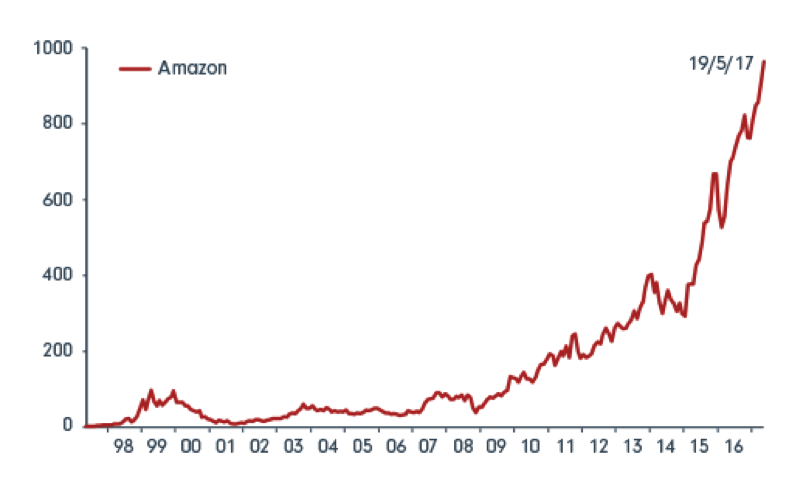Amazon is proof active investing is fit and well
It is 20 years last Friday since the stock market flotation of Amazon. Quite rightly, this anniversary has focused attention on the remarkable story of how an online bookseller revolutionised retail. In two decades its sales have grown from $16m to $136bn. The company is now valued at nearly twice as much as Walmart, the world’s largest bricks and mortar retailer. Almost single-handedly, Amazon has changed the way the world shops.
There is another facet of the Amazon story that will get less attention today. It is the case that Amazon’s stellar stock market performance over the past 20 years makes for active investment. Active management, that is to say seeking out tomorrow’s winners rather than passively tracking a stock market index, is deeply out of fashion today, ineffective and expensive according to its many critics. Amazon is an extreme example of why the shrill chorus defending passive investing is wrong.
Amazon’s shares have delivered a compound annual return of nearly 40pc since 1997. Thanks to the magical power of compound interest, this unusual combination of exceptional growth and time has turned a $100 investment into $64,000.

Source: Thomson Reuters Datastream
I mention persistence because it would have required fortitude to stick with Amazon in the early days. Having come to the market at $18, the shares hit $113 at the height of the dot.com bubble in December 1999 but fell to a low of $5.51 less than two years later as the internet craze imploded.
So what is the case for active investment that Amazon makes? At its most basic, it is an illustration of the fact that a stock market index is an average made up of outperformers and laggards, winners and losers. The S&P 500 index has risen by 300pc over the past 20 years. That’s not bad but it is a fraction of the 63,000pc delivered by Amazon.
There is more to this than simple arithmetic. One of the lessons of Amazon’s stellar success has been how technological disruption has fuelled the monopolistic tendencies of the capitalist system. Teddy Roosevelt may have broken up Standard Oil in the early years of the last century but he could not counter the simple truth that the global economy has a habit of rewarding success with yet more success. We live in a winner takes all world and Amazon, Google, Facebook are just the latest manifestations of this fact.
So as the business world becomes ever more concentrated, the importance of picking winners and sticking with them increases. An investor who invests in every company in an index will naturally be exposed to the next Amazon but the benefit will be massively diluted by the many other businesses whose lunch is being eaten by each sector’s winners.
The second lesson from the Amazon story is the acceleration in the business cycle thanks to the rapacious success of a handful of companies. A generation ago a business might, on average, expect to be around for 40 years. Today 15 years is more like it. This has great significance for stock market investors because it means that by the time a company has grown enough to list its shares on a publicly traded stock market it will, in too many cases, be heading into its twilight years. It is exaggerating to say that the stock market is where growth companies are put out to grass but it’s fair to say that public markets have a good sprinkling of yesterday’s not tomorrow’s winners. This is all the more reason not to adopt a scatter-gun approach to investing.
A third reason to believe that now is just the wrong time to be jumping on the passive bandwagon is what has driven the market as a whole over the past eight years or so since the financial crisis. Thanks to the extraordinary measures taken to rescue the world from that disaster, the past few years have been a remarkably favourable time to be a stock market investor. Share prices have been re-rated higher, while the shift in returns from labour to capital has boosted corporate profits. Both of those trends may now have played out.
If that leads to one of the stock market’s periodic phases of sideways drift, then the case for passive investing will be further weakened. Investors may be rushing headlong into an approach that is doomed to disappoint. These crab-like episodes are pretty commonplace in stock market history and can persist for years. At times like these, if you want to make money in the stock market you have to roll up your sleeves and engage in the hard work of finding tomorrow’s winners not just sit back and let the market do the heavy lifting for you.
Fortunately, our research suggests that sideways markets can provide a very healthy backdrop for stock-pickers. We looked at four periods of becalmed markets in Asia, Japan, the US and Britain and found that in each a surprisingly high proportion of companies performed exceptionally well. Our measure of this was a stock rising more than 75pc over a three year period.
In the US, we found 93 of the S&P’s 500 constituents achieved this level of share price growth, while in Britain 178 of the FTSE All Share’s 605 members did so. They represented nearly 20pc and 30pc of the companies listed in the respective indices.
It is fashionable to believe today that passive investing has fatally wounded traditional stock-picking. Amazon’s 20 years on the stock market is proof that active investing remains fit and well.
----
This document may include general commentary on market activity, sector trends or other broad-based economic or political conditions that should not be taken as investment advice. Information stated herein about specific securities is subject to change. Any reference to specific securities should not be taken as a recommendation to buy, sell or hold these securities.
This document is issued by FIL Responsible Entity (Australia) Limited ABN 33 148 059 009, AFSL No. 409340 (“Fidelity Australia”). Fidelity Australia is a member of the FIL Limited group of companies commonly known as Fidelity International.
Investments in overseas markets can be affected by currency exchange and this may affect the value of your investment. Investments in small and emerging markets can be more volatile than investments in developed markets.
This document is intended for use by advisers and wholesale investors. Retail investors should not rely on any information in this document without first seeking advice from their financial adviser. You should consider these matters before acting on the information. You should also consider the relevant Product Disclosure Statements (“PDS”) for any Fidelity Australia product mentioned in this document before making any decision about whether to acquire the product. The PDS can be obtained by contacting Fidelity Australia on 1800 119 270 or by downloading it from our website at (VIEW LINK). While the information contained in this document has been prepared with reasonable care, no responsibility or liability is accepted for any errors or omissions or misstatements however caused. This document is intended as general information only. The document may not be reproduced or transmitted without prior written permission of Fidelity Australia. Theissuer of Fidelity’s managed investment schemes is FIL Responsible Entity (Australia) Limited ABN 33 148 059 009. Reference to ($) are in Australian dollars unless stated otherwise.
© 2017 FIL Responsible Entity (Australia) Limited. Fidelity, Fidelity International and the Fidelity International logo and F symbol are trademarks of FIL Limited.

